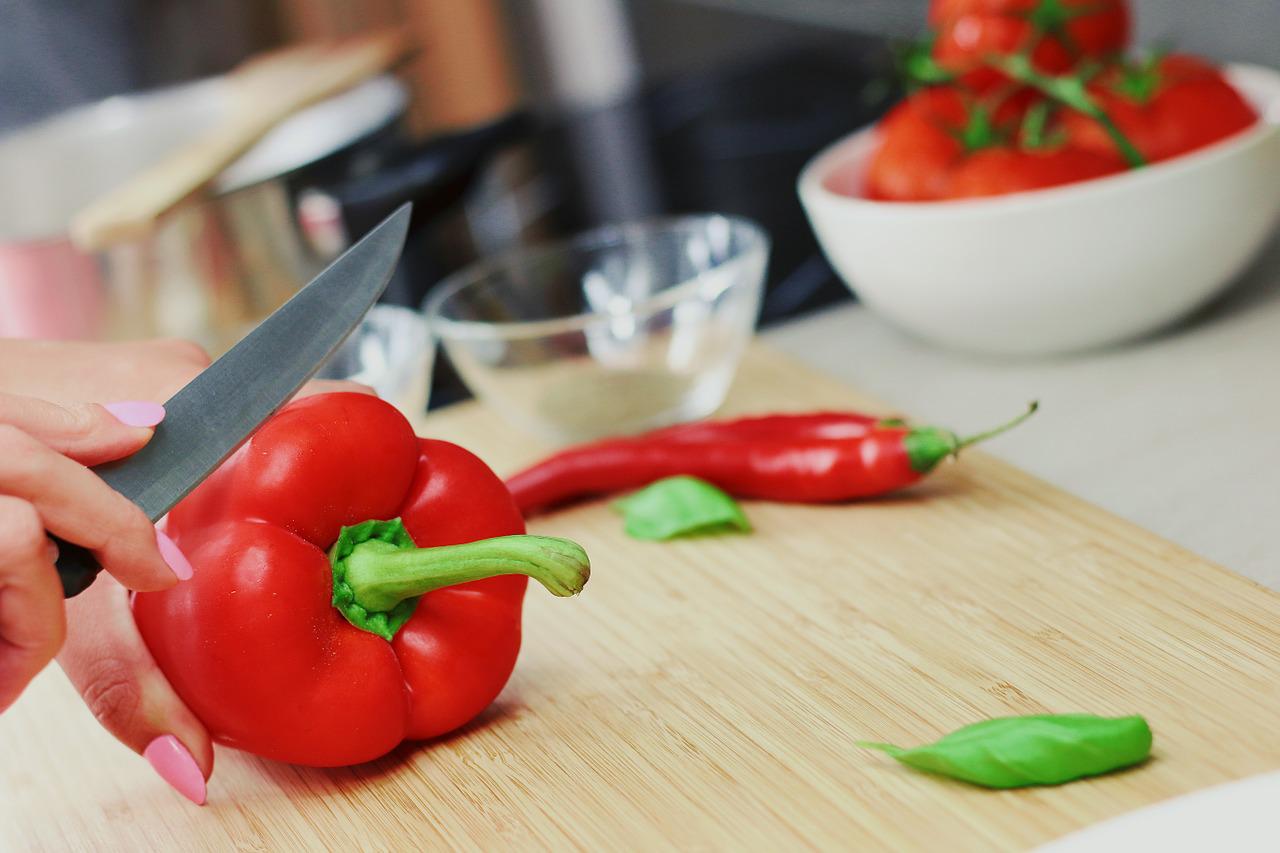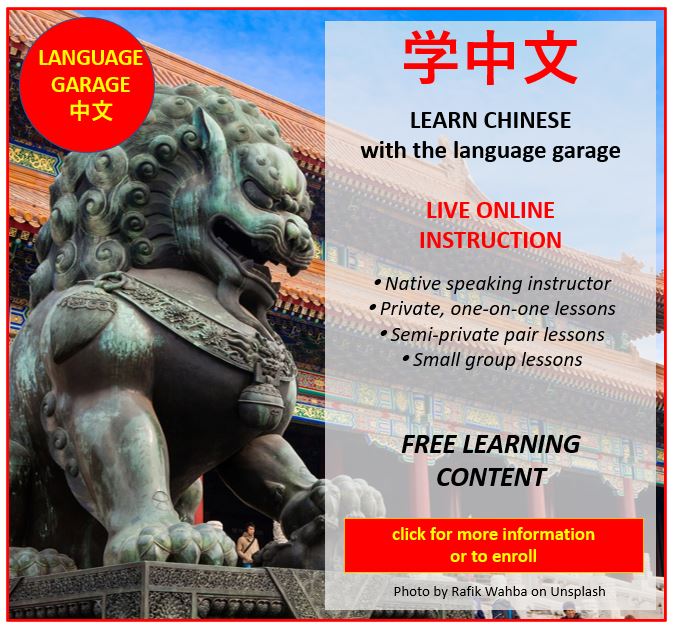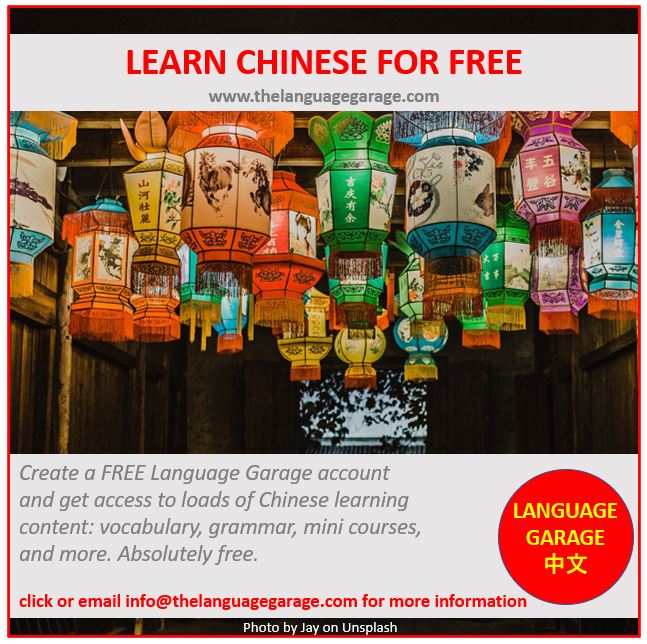Image Credit: Jeshoots.com on Pixabay
In this post we’ll look at some Chinese vocabulary and expressions for an important part of everyday life: 厨房 chúfáng the kitchen. 你做饭吗? Nǐ zuò fàn ma? Do you cook? No matter how you answer, you probably spend a decent amount of time in the kitchen, so let’s dig in.
盘子、杯子、叉子 pánzi, bēizi, chāzi Plate, Cups, Forks
Let’s start with the things you use to eat. Of course the basics are: 盘子 pánzi plate, 碗 wǎn bowl, 刀 dāo knife, 汤匙 tāngchí spoon, 叉子 chāzi fork, 筷子 kuàizi chopsticks, 杯子 bēizi cup, 玻璃杯 bōlí bēi glass, 餐巾纸 cānjīnzhǐ napkin.
- 叉子、刀子和汤匙在哪里?
Chāzi, dāozi hé tāngchí zài nǎlǐ?
Where are the forks, knives, and spoons? - 叉子、刀子和汤匙都在抽屉里。
Chāzi, dāozi hé tāngchí dōu zài chōutì lǐ.
The forks, knives, and spoons are in the drawer.
- 干净的玻璃杯在柜子里。
Gānjìng de bōlí bēi zài guìzi lǐ.
The clean glasses are in the cabinet. - 咖啡杯在架子上。
Kāfēi bēi zài jiàzi shàng.
The coffee cups on are the shelf. - 我打破了一个酒杯。
Wǒ dǎpòle yīgè jiǔbēi.
I broke a wine glass. - 你用木筷子还是金属筷子?
Nǐ yòng mù kuài zǐ huán shì jīnshǔ kuàizi?
Do you use wooden or metal chopsticks? - 请给我一张餐巾纸好吗?
Qǐng gěi wǒ yī zhāng cānjīnzhǐ hǎo ma?
Could I have a napkin, please? - 你有更大的碗盛汤吗?
Nǐ yǒu gèng dà de wǎn chéng tāng ma?
Do you have bigger bowls for the soup? - 请把干净的盘子放在柜子里。
Qǐng bǎ gānjìng de pánzi fàng zài guìzi lǐ.
Please put the clean plates in the cabinet.
厨房电器 Chúfáng diànqì Kitchen Appliances
Even if you don’t have a lot of gadgets in your kitchen, your probably got most of these: 一台冰箱 yī tái bīngxiāng a refrigerator, 一台炉子 yī tái lúzǐ a stove/cooker, 一台烤箱 yī tái kǎoxiāng an oven, 一台微波炉 yī tái wéibōlú a microwave oven, 一台烤面包机 yī tái kǎo miànbāojī a toaster, 一个水槽 yīgè shuǐcáo a sink, 一台洗碗机 yī tái xǐ wǎn jī a dishwasher.
- 牛奶在冰箱里。
niúnǎi zài bīngxiāng lǐ.
The milk is in the refrigerator. - 请把冰箱门关上!
Qǐng bǎ bīngxiāng mén guānshàng!
Close the refrigerator door please! - 我在炉子上煮汤。
Wǒ zài lúzǐ shàng zhǔ tāng.
I cook soup on the stove. - 我在烤箱里烤蛋糕和面包。
Wǒ zài kǎoxiāng lǐ kǎo dàngāo huò miànbāo.
I bake cakes and bread in the oven. - 我在微波炉里加热剩菜。
Wǒ zài wéibōlú lǐ jiārè shèng cài.
I reheat left-overs in the microwave. - 我在烤面包机里烤吐司。
Wǒ zài kǎo miànbāo jī lǐ kǎo tǔ sī.
I make toast in the toaster. - 脏盘子在水槽里。
Zāng pánzi zài shuǐcáo lǐ.
The dirty dishes are in the sink. - 我需要清空洗碗机。
Wǒ xūyào qīngkōng xǐ wǎn jī.
I need to empty the dishwasher.
And depending on where you live and what you like to eat, there’s also: 一台饭锅 yī tái fàn guō a rice maker, 一台咖啡机 yī tái kāfēi jī a coffee maker, 一个电热水壶yīgè diànrè shuǐhú an electric kettle, 一台慢炖锅 yī tái màn dùn guō a slow cooker, 一台气炸锅 yī tái qì zhá guō an air fryer, 一台面包机 yī táimiànbāo jī a bread machine, 一台冰淇淋机 yī tái bīngqílín jī an ice-cream maker, 一台油炸锅 yī tái yóu zhá guō a deep fryer.
- 我总是用饭锅。我从不在炉子上煮米饭。
Wǒ zǒng shì yòngfàn guō. Wǒ cóng bùzài lúzǐ shàng zhǔ mǐfàn.
I always use a rice maker. I never cook rice on the stove. - 我们需要一台新的咖啡机。
Wǒmen xūyào yī táixīn de kāfēi jī.
We need a new coffee maker. - 我用电热水壶烧水。
Wǒ yòng diànrè shuǐhú shāo shuǐ.
I boil water in the electric kettle. - 你经常用你的慢炖锅吗?
Nǐ jīngcháng yòng nǐ de màn dùn guō ma?
Do you use your slow cooker often? - 气炸锅不使用很多油。
Qì zhá guō bù shǐyòng hěnduō yóu.
Air friers don’t use a lot of oil. - 我用面包机做面包。
Wǒ yòng miànbāo jī zuò miàn bāo.
I make bread in the bread maker. - 我生日买了一台冰淇淋机。
Wǒ shēngrì mǎile yī tái bīngqílín jī.
I got an ice cream maker for my birthday. - 油炸锅使用很多油。
Yóu zhá guō shǐyòng hěnduō yóu.
Deep friers use a lot of oil.
砧板和搅拌碗 zhēnbǎn hé jiǎobàn wǎn Cutting boards and Mixing Bowls
No matter how much you cook, you probably have at least a few of these: 一块砧板 yīkuài zhēnbǎn a cutting board, 一套刀具 yī tào dāojù a set of knives, 一个搅拌碗 yīgè jiǎobàn wǎn a mixing bowl, 一把木勺 yī bǎ mù sháo a wooden spoon, 一个勺子 yīgè sháozi a ladle, 一台食材料理机 yī tái shícáiliàolǐ jī a food processor, 一台电动搅拌机 yī tái diàndòng jiǎobànjī an electric mixer, 一个炒锅 yīgè chǎo guō a wok, 一张烤盘纸 yī zhāng kǎo pán zhǐ a baking sheet, 一个烤盘 yīgè kǎo pán a baking pan, 一个煎锅 yīgè jiān guō a frying pan, 一个汤锅 yīgè tāngguō a pot.
- 我在砧板上切菜。
Wǒ zài zhēnbǎn shàng qiē cài.
I cut vegetables on a cutting board. - 料理台上没有空间。
Liàolǐ tái shàng méiyǒu kòng jiān.
There’s no space on the counter. - 你有一套锋利的刀具吗?
Nǐ yǒuyī tào fēnglì de dāojù ma?
Do you have a set of sharp knives? - 我在搅拌碗里混合材料。
Wǒ zài jiǎobàn wǎn lǐ hùnhé cái liào.
I mix ingredients in a mixing bowl. - 我用木勺搅拌汤。
Wǒ yòng mù sháo jiǎobàn tāng.
I stir soup with a wooden spoon. - 我用勺子盛汤。
Wǒ yòng sháozi chéng tāng.
I use a ladle to serve soup. - 食材料理机又快又方便。
Shícái liàolǐ jī yòu kuài yòu fāngbiàn.
Food processors are fast and convenient. - 你经常使用电动搅拌机吗?
Nǐ jīngcháng shǐyòng diàndòng jiǎobànjī ma?
Do you use the electric mixer often? - 饼干在烤盘上。
Bǐnggān zài kǎo pán shàng.
The cookies are on the baking sheet. - 我在烤盘里烤鱼。
Wǒ zài kǎo pán lǐ kǎo yú.
I cook fish in a baking pan. - 我经常用炒锅。
Wǒ jīngcháng yòng chǎo guō.
I use the wok very often. - 我在煎锅里煎蛋。
Wǒ zài jiān guō lǐ jiān dàn.
I cook eggs in a frying pan. - 你有一个大汤锅来煮汤吗?
Nǐ yǒu yīgè dà tāngguō lái zhǔ tāng ma?
Do you have a large pot for the soup?
我正在做晚餐。 Wǒ zhèngzài zuò wǎncān. I’m Making Dinner.
If you’re looking for vocabulary and expressions related to cooking, check out this post. And here’s a bunch of food vocabulary that will come in handy when you’re talking about eating or cooking:
- 面包 miànbāo bread
- 饭 fàn rice
- 意大利面 yìdàlì miàn pasta
- 面条 miàntiáo noodles
- 肉 ròu meat
- 鸡肉 jīròu chicken
- 牛肉 niúròu beef
- 猪肉 zhūròu pork
- 火腿 huǒtuǐ ham
- 鱼 yú fish
- 羊肉 yángròu lamb
- 豆腐 dòufu tofu
- 蔬菜 shūcài vegetables
- 番茄 fānqié tomato
- 洋葱 yángcōng onion
- 大蒜 dàsuàn garlic
- 莴苣 wōjù lettuce
- 菠菜 bōcài spinach
- 芦笋 lúsǔn asparagus
- 卷心菜 juǎnxīncài cabbage
- 蘑菇 mógū mushroom
- 黄瓜 huángguā cucumber
- 青椒 qīngjiāo pepper (bell)
- 辣椒 làjiāo chili pepper
- 水果 shuǐguǒ fruit
- 苹果 píngguǒ apple
- 梨子 lízi pear
- 桃子 táozi peach
- 橙 chéng orange
- 柠檬 níngméng lemon
- 葡萄 pútáo grape
- 草莓 cǎoméi strawberry
- 香蕉 xiāngjiāo banana
- 坚果 jiānguǒ nut
- 花生 huāshēng peanut
- 种子 zhǒngzǐ seed
- 小麦 xiǎomài wheat
- 麦片 màipiàn cereal
- 盐 yán salt
- 胡椒 hújiāo pepper
- 芝麻 zhīma sesame
- 蜂蜜 fēngmì honey
- 糖 táng sugar
- 蛋 dàn egg
- 牛奶 niúnǎi milk
- 水 shuǐ water
- 茶 chá tea
- 咖啡 kāfēi coffee
- 酒 jiǔ wine
- 啤酒 píjiǔ beer
- 豆浆 dòujiāng soy milk
- 酱油 jiàngyóu soy sauce
- 起司 qǐsī cheese
- 冰淇淋 bīngqílín ice cream
- 蛋糕 dàngāo cake
- 派 pài pie
- 曲奇饼 qū qí bǐng cookie
- 糖果 tángguǒc andy
- 吃 chī to eat
- 喝 hē to drink
- 做饭 zuò fàn to cook
- 尝 cháng to taste
容器、罐子和袋子 róngqì, guànzi hé dàizi Containers, Jars, and Bags
Different foods are stored in different types of containers, so may want to say:
- 一盒意大利面/饼干/麦片
yī hé yìdàlì miàn/bǐnggān/màipiàn
a box of pasta/cookies/cereal - 一袋土豆/冷冻蔬菜
yī dài tǔdòu/lěngdòng shūcài
a bag of potatoes/frozen vegetables - 一瓶水/酒
yī píng shuǐ/jiǔ
a bottle of water/wine - 一盒牛奶/果汁
yī hé niúnǎi/guǒzhī
a carton of milk/juice - 一罐豆子/金枪鱼/汤
yī guàn dòuzi/jīnqiāngyú/tāng
a can of beans/tuna/soup - 一罐橄榄/腌黄瓜/水果蜜饯
yī guàn gǎnlǎn/yān huángguā/shuǐguǒ mìjiàn
a jar of olives/pickles/fruit preserves - 一包番茄酱/美乃滋
yī bāo fānqié jiàng/měinǎi zī
a container of ketchup/mayonnaise - 一包鸡肉/豆腐
yī bāo jīròu/dòufu
a package of chicken/tofu
厨房很干净! Chúfáng hěn gānjìng! The kitchen is clean!
Even if you don’t use it much, the kitchen always seems to need cleaning. And there’s a whole set of vocabulary that you can use to talk about that: 一个扫帚 yīgè sàozhǒu a broom, 一个拖把 yīgè tuōbǎ a mop, 一块海绵 yīkuài hǎimián a sponge, 洗碗剂 xǐ wǎn jì dish detergent, 擦碗布 cā wǎn bù a dishtowel, 喷雾清洁剂 pēnwù qīngjié jì a spray cleaner, 纸巾 zhǐjīn a paper towel, 一个桶子yīgè tǒng zi a bucket, 地板清洁剂 dìbǎn qīngjié jì floor cleaner, 垃圾桶/箱lèsè tǒng/xiāng trash can/bin.
- 我需要洗碗。
Wǒ xūyào xǐ wǎn.
I need to do the dishes. - 我们需要买洗碗剂。
Wǒmen xū yāo mǎi xǐ wǎn jì.
We need to buy dish detergent. - 我用海绵和擦碗布洗碗。
Wǒ yòng hǎimián hé cā wǎn bù xǐ wǎn.
I use a sponge and a dishtowel to do the dishes. - 我用扫帚扫地。
Wǒ yòng sàozhǒu sǎodì.
I sweep the floor with a broom. - 地板脏的时候我会拖地。
Dìbǎn zàng de shíhòu wǒ huì tuō dì.
I mop the floor when it’s dirty. - 我用纸巾和喷雾清洁剂擦料理台。
Wǒ yòng zhǐjīn hé pēnwù qīngjié jì cā liàolǐ tái.
I wipe the counter with a paper towel and a spray cleaner. - 我在桶子里放了地板清洁剂和温水。
Wǒ zài tǒng zi lǐ fàngle dìbǎn qīngjié jì hé wēnshuǐ.
I put floor cleaner and warm water in the bucket. - 我需要倒垃圾。
Wǒ xūyào dào lèsè.
I need to take out the trash. - 垃圾桶很臭!
Lèsè tǒng hěn chòu!
The trashcan smells bad!
Do you want to learn Chinese?
Check out our other posts on Chinese language, culture, and more. And if you’re looking for convenient and affordable live Chinese lessons with a real teacher, check out The Language Garage. Our lessons are given online in a virtual classroom, so it doesn’t matter where you live or work – we can come to you. And we have flexible options, with a free trial so that you can decide if there’s a fit. Check us out!





